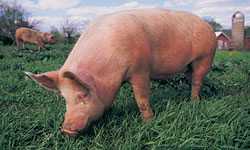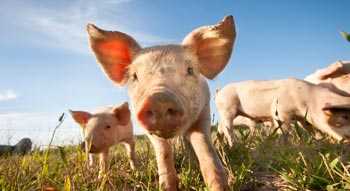Information on Swine Influenza/Variant Influenza Virus
Swine influenza is a respiratory disease of pigs caused by type A influenza viruses that regularly cause outbreaks of influenza in pigs. Influenza viruses that commonly circulate in swine are called “swine influenza viruses” or “swine flu viruses.” Like human influenza viruses, there are different subtypes and strains of swine influenza viruses. The main swine influenza viruses circulating in U.S. pigs in recent years have been, swine triple reassortant (tr) H1N1 influenza virus, trH3N2 virus, and trH1N2 virus.
Print Materials
- Key Facts for People Exhibiting Pigs at Fairs [545 KB, 2 pages]
- Take Action to Prevent the Spread of Flu Between People and Pigs [1.3 MB, 2 pages]
- Educational Posters [389 KB, 1 page]
- Compendium of Measures to Prevent Disease Associated with Animals in Public Settings, 2013.
- Reduce Your Risk (English) [22 KB, 1 page] | (Spanish) [22 KB, 1 page]
- Measures to Minimize Influenza Transmission at Swine Exhibitions, 2016 – NASAHO and NASPHV [97 KB, 8 pages]
Videos / Podcast
Dr. Lyn Finelli discusses CDC’s recommendations for reducing the risk of infection with H3N2v flu viruses for fairgoers and swine exhibitors.
More Information
Swine Influenza/Variant Influenza Microsite
- Page last reviewed: May 19, 2017
- Page last updated: May 19, 2017
- Content source:
- Centers for Disease Control and Prevention, National Center for Immunization and Respiratory Diseases (NCIRD)
- Page maintained by: Office of the Associate Director for Communication, Digital Media Branch, Division of Public Affairs


 ShareCompartir
ShareCompartir




